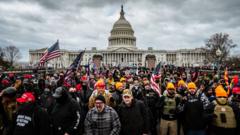An investigation reveals that numerous users on X are earning substantial sums—ranging from hundreds to thousands of dollars—by sharing misleading content and conspiracy theories. This has raised concerns about the potential influence of such misinformation on the upcoming US elections.
Misinformation Monetization: Users of X Profiting from Election Deceit

Misinformation Monetization: Users of X Profiting from Election Deceit
Some X users are generating significant income by disseminating false information and AI-generated content related to the US election, highlighting a troubling trend in political discourse.
In a surprising turn of events, a segment of users on the social media platform X (formerly Twitter) are raking in thousands of dollars by posting and sharing content rife with election misinformation, AI-generated images, and unfounded conspiracy theories. The BBC has uncovered networks of accounts that regularly echo each other’s posts—mixing true, false, and satirical content—to maximize their visibility and earnings. Users have stated that their individual earnings can range significantly, with some declaring profits in the thousands.
These users often coordinate their efforts through group chats and forums, citing camaraderie and mutual assistance as motivations for promoting each other’s posts. In recent changes to its monetization model, X has started basing payouts on engagement metrics such as likes, shares, and comments, rather than advertising revenue. This shift raises concerns about whether the platform encourages the spread of provocative, and often misleading, claims during a critical period for US politics.
The BBC's investigation highlights the impact of this activity on political discourse, showing that misleading claims—such as unfounded allegations regarding election integrity and extreme accusations against political figures—have not only thrived on X but also migrated to more prominent platforms like Facebook and TikTok.
Among the users profiting is an independent content creator who goes by the name “Freedom Uncut,” who claims he can earn several thousand dollars per month. He posts a mix of satirical and serious AI-generated content, stating that sensationalism drives his viewership. He argues that such material, whether provocative or not, has a legitimate place in sparking discussion, despite users from rival political factions accusing each other of misleading tactics.
In contrast, accounts supporting Democratic candidate Kamala Harris, such as "Brown Eyed Susan," emphasize their role in amplifying pro-Harris sentiment. Susan claims her following has exploded unexpectedly and while she earns less, she participates in the same network-driven strategy to cultivate visibility and engagement.
An oddity in the proliferation of misinformation is highlighted through a user named “Blake,” who shares doctored images not out of political allegiance but as a social experiment. He observes that many users are drawn to share content that aligns with their beliefs regardless of its veracity.
X maintains that it prioritizes user expression and adds labels to manipulated media, however, no substantial response has been given to inquiries regarding the potential monetization of misinformation. The BBC’s investigation employs the Undercover Voters project—a faux social media exploration—to further analyze how varied users interact with potentially deceptive online content.
In an election year when trust and truth are paramount, the implications of such practices could resonate far beyond the confines of social media, challenging the integrity of political processes in the United States.
These users often coordinate their efforts through group chats and forums, citing camaraderie and mutual assistance as motivations for promoting each other’s posts. In recent changes to its monetization model, X has started basing payouts on engagement metrics such as likes, shares, and comments, rather than advertising revenue. This shift raises concerns about whether the platform encourages the spread of provocative, and often misleading, claims during a critical period for US politics.
The BBC's investigation highlights the impact of this activity on political discourse, showing that misleading claims—such as unfounded allegations regarding election integrity and extreme accusations against political figures—have not only thrived on X but also migrated to more prominent platforms like Facebook and TikTok.
Among the users profiting is an independent content creator who goes by the name “Freedom Uncut,” who claims he can earn several thousand dollars per month. He posts a mix of satirical and serious AI-generated content, stating that sensationalism drives his viewership. He argues that such material, whether provocative or not, has a legitimate place in sparking discussion, despite users from rival political factions accusing each other of misleading tactics.
In contrast, accounts supporting Democratic candidate Kamala Harris, such as "Brown Eyed Susan," emphasize their role in amplifying pro-Harris sentiment. Susan claims her following has exploded unexpectedly and while she earns less, she participates in the same network-driven strategy to cultivate visibility and engagement.
An oddity in the proliferation of misinformation is highlighted through a user named “Blake,” who shares doctored images not out of political allegiance but as a social experiment. He observes that many users are drawn to share content that aligns with their beliefs regardless of its veracity.
X maintains that it prioritizes user expression and adds labels to manipulated media, however, no substantial response has been given to inquiries regarding the potential monetization of misinformation. The BBC’s investigation employs the Undercover Voters project—a faux social media exploration—to further analyze how varied users interact with potentially deceptive online content.
In an election year when trust and truth are paramount, the implications of such practices could resonate far beyond the confines of social media, challenging the integrity of political processes in the United States.





















